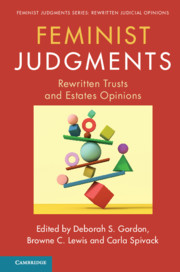Book contents
- Feminist Judgments: Rewritten Trusts and Estates Opinions
- Feminist Judgments Series Editors
- Advisory Panel for Feminist Judgments Series
- Feminist Judgments: Rewritten Trusts and Estates Opinions
- Copyright page
- Dedication
- Contents
- Advisory Panel for Feminist Judgments: Rewritten Trusts and Estates Opinions
- Notes on Contributors
- Preface
- Acknowledgments
- Table of Cases
- 1 Introduction to the Feminist Judgments: Rewritten Trusts and Estates Opinions Project
- 2 Commentary on In re Strittmater’s Estate
- 3 Commentary on In re Will of Moses
- 4 Commentary on In re Estate of Wilson
- 5 Commentary on O’Neal v. Wilkes
- 6 Commentary on Via v. Putnam
- 7 Commentary on In re Estate of Myers
- 8 Commentary on Egelhoff v. Egelhoff
- 9 Commentary on Drevenik v. Nardone
- 10 Commentary on Reece v. Elliott
- 11 Commentary on Khabbaz v. Commissioner
- 12 Commentary on Karsenty v. Schoukroun
- Index
8 - Commentary on Egelhoff v. Egelhoff
Published online by Cambridge University Press: 28 August 2020
- Feminist Judgments: Rewritten Trusts and Estates Opinions
- Feminist Judgments Series Editors
- Advisory Panel for Feminist Judgments Series
- Feminist Judgments: Rewritten Trusts and Estates Opinions
- Copyright page
- Dedication
- Contents
- Advisory Panel for Feminist Judgments: Rewritten Trusts and Estates Opinions
- Notes on Contributors
- Preface
- Acknowledgments
- Table of Cases
- 1 Introduction to the Feminist Judgments: Rewritten Trusts and Estates Opinions Project
- 2 Commentary on In re Strittmater’s Estate
- 3 Commentary on In re Will of Moses
- 4 Commentary on In re Estate of Wilson
- 5 Commentary on O’Neal v. Wilkes
- 6 Commentary on Via v. Putnam
- 7 Commentary on In re Estate of Myers
- 8 Commentary on Egelhoff v. Egelhoff
- 9 Commentary on Drevenik v. Nardone
- 10 Commentary on Reece v. Elliott
- 11 Commentary on Khabbaz v. Commissioner
- 12 Commentary on Karsenty v. Schoukroun
- Index
Summary
The case of Egelhoff v. Egelhoff began as a family dispute in the State of Washington, between two children from a first marriage and a widow from a second marriage, involving $81,000. The case reached its apex in the Supreme Court of the United States because it involved employee welfare and pension plan benefits under the Employee Retirement Income Security Act of 1974, as amended (ERISA), and it affected the administration of ERISA plans throughout the country.
- Type
- Chapter
- Information
- Feminist JudgmentsRewritten Trusts and Estates Opinions, pp. 149 - 178Publisher: Cambridge University PressPrint publication year: 2020

